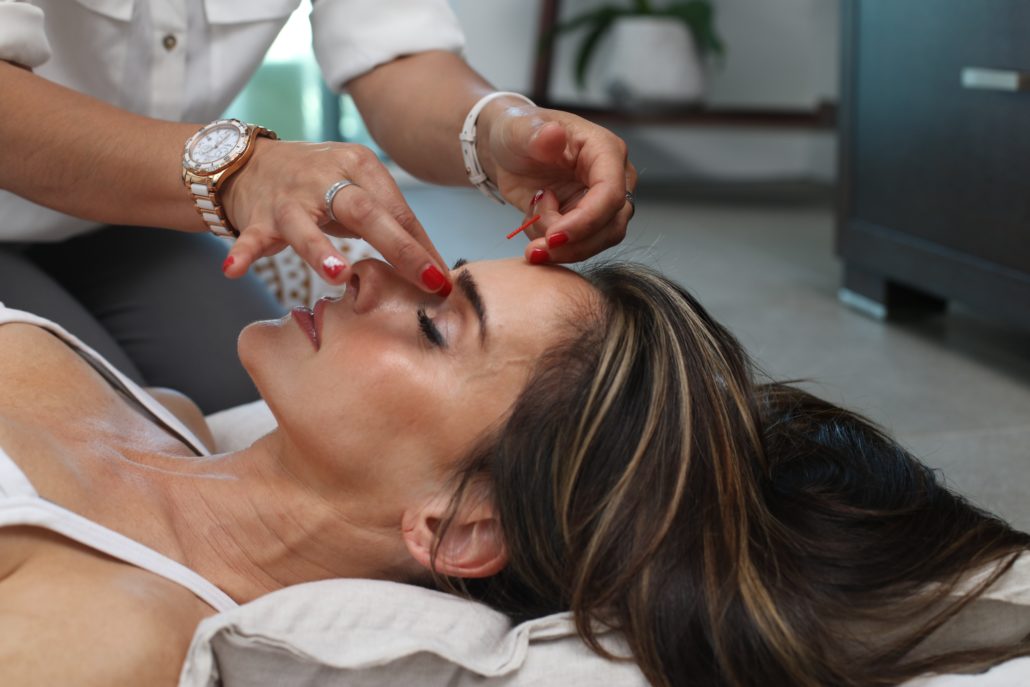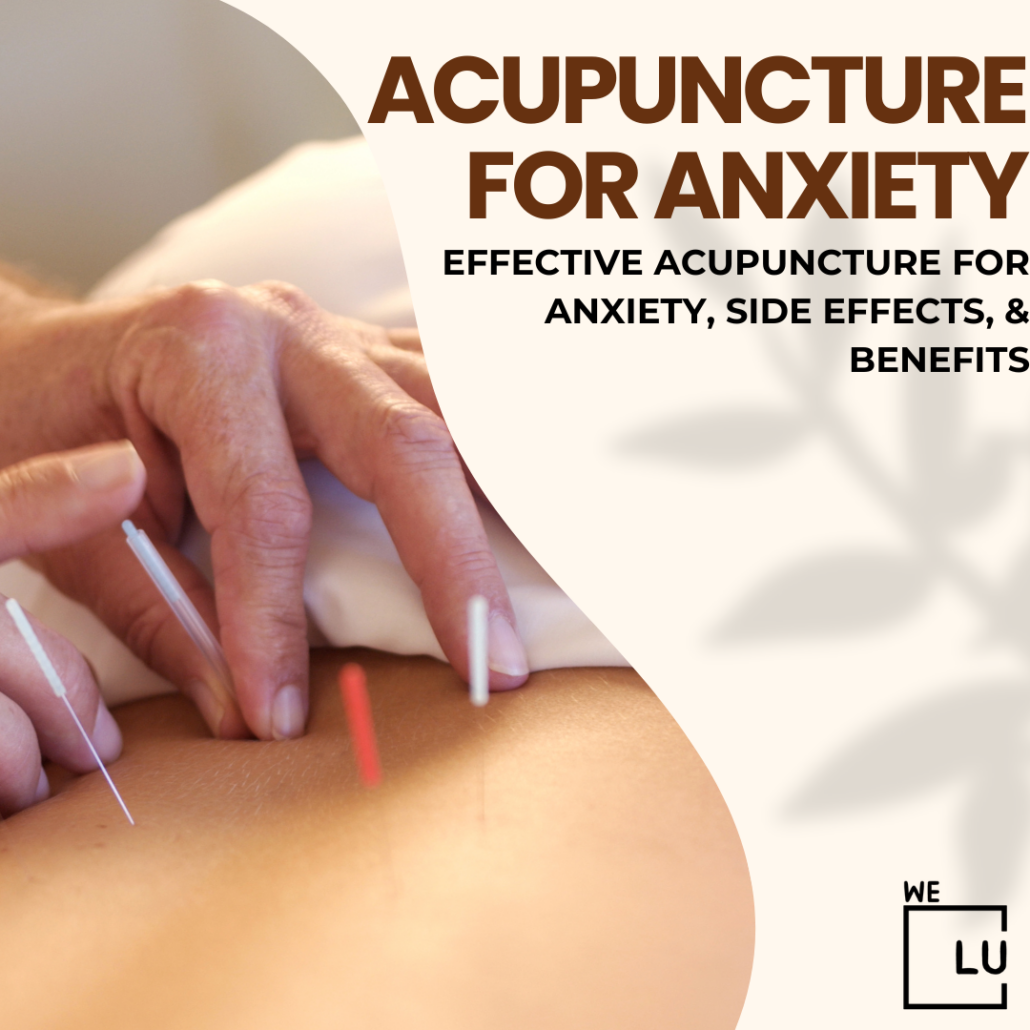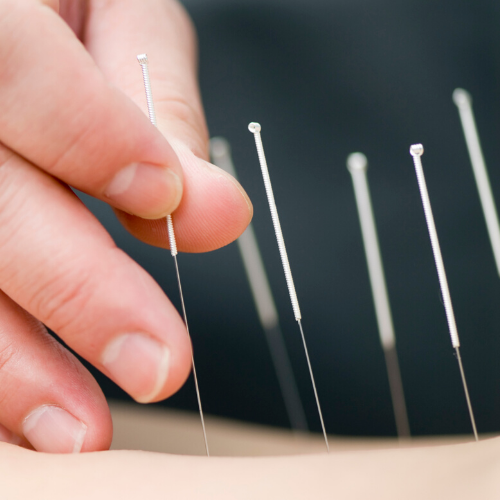Acupuncture For Depression
Depression and anxiety are considered warning signs in Eastern philosophy because they are signs that something more serious is going on inside the body. Traditional Chinese medicine refers to this source of life energy as “qi,” and when it is out of balance, it causes sickness, which can show up as depression and anxiety.
Although acupuncture is not a panacea, it can help with the symptoms of depression and anxiety when used as a part of an integrative strategy to make the entire body healthy.
A licensed practitioner places thin, thread-like needles into particular bodily nerve sites during acupuncture for anxiety and depression.
Each needle pokes and activates a sensory nerve, causing it to become active and begin communicating with the brain. Endorphins, the body’s natural painkillers, are then released by the brain, causing the immune system to react and promoting healing throughout the body.
Acupuncture treatments typically last about 30 minutes. The needles will then be positioned all over the body, and the practitioner will either manually move them or stimulate them with electrical currents to encourage the body’s neurochemical activity.
What is Acupuncture?
Acupuncture involves the insertion of ultra-thin metallic needles, equivalent to the width of a human hair, into specific areas of the body tailored to address various health conditions. The insertion points depend on the particular health issue being addressed. Some ailments treated through acupuncture encompass:
- Arthritis.
- Menstrual cramps.
- Chronic pain.
- Acute pain such as muscle, back, and knee pain.
- Migraines and headaches.
- Sports injuries.
- Allergies.
Within traditional Chinese medicine, it is theorized that the body sustains a flow of energy, known as qi, that governs one’s health. When this energy flow is disrupted, it can lead to illness. By inserting needles into precise acupuncture points recognized as meridians, the aim is to restore equilibrium in the energy flow and enhance overall health.
What is Depression?
Depression, clinically termed major depressive disorder, is a condition characterized by persistent feelings of sadness and diminished interest or pleasure in activities. Additionally, individuals may experience various other symptoms, including:
- Disturbed sleep patterns (either difficulty sleeping or excessive sleeping).
- Fatigue and a general lack of energy.
- Thoughts related to death or suicide.
- Changes in appetite and weight.
- Irritability and heightened frustration, often over minor matters.
- Difficulty concentrating, making decisions, or recalling information.
- Feelings of guilt or worthlessness.
Common treatments for depression involve medication, psychotherapy, or a combination of both. However, a considerable percentage, ranging between 19% to 34%, of individuals with depression do not show improvement with standard treatments. Additionally, a significant portion (15% to 50%) may experience recurrent depressive episodes despite ongoing therapeutic interventions.
Some individuals grappling with depression are exploring alternative treatments like acupuncture. In the United Kingdom, psychological distress, including depression, emerged as the second most prevalent reason prompting individuals to seek acupuncture as an alternative therapy.

Skip To:
Learn More:
- Studies Find That A Dose of Psilocybin May Ease Symptoms of Anxiety and Depression
- What Does Depression Feel Like? Symptoms and Early Signs
- Why Am I So Sad? Causes and Top 10 Coping Tips for Depression
- What is Mild Depression? Symptoms and Treatment
- What is Crippling Depression? Learning How To Deal With Crippling Depression
- Atypical Depression. What Is It? Symptoms and Treatment
- Learn How to Cope with Depression. 10 Ways to Cope with Depression.
- Manic Depression Vs Bipolar. Are They The Same?
- Situational Depression Vs Clinical Depression, Symptoms, Causes, and Treatment
- Signs Of Depression In Women, Symptoms and Treatment
- Effective Depression Treatment, Depressive Disorder Symptoms, Types, and Causes
Get Help. Get Better. Get Your Life Back.
Searching for Accredited Dual Diagnosis Mental Health Centers Near You?
Even if therapy failed previously, or are in the middle of a difficult crisis, we stand ready to support you. Our trusted behavioral health specialists will not give up on you. When you feel ready or just want someone to speak to about counseling alternatives to change your life call us. Even if we cannot assist you, we will lead you to wherever you can get support. There is no obligation. Call our hotline today.
FREE 24/7 Dual Diagnosis Mental Health Services HotlineDepression Fact Sheet
Depression Overview
Depression is a group of illnesses like depression or bipolar disorder that are connected to mood elevation or depression
Types of Depression
Clinical Depression: A mental health disorder characterized by persistently depressed mood or loss of interest in activities, causing significant impairment in daily life.
Persistent depressive disorder: A mild but long-term form of depression.
Bipolar disorder: A disorder associated with episodes of mood swings ranging from depressive lows to manic highs.
Bipolar II disorder: A type of bipolar disorder characterized by depressive and hypomanic episodes.
Postpartum depression: Depression that occurs after childbirth.
Depression Treatments
- Support group: A place where those pursuing the same disease or objective, such as weight loss or depression, can receive counseling and exchange experiences.
- Cognitive behavioral therapy: A conversation treatment that aimed to change the negative attitudes, actions, and feelings connected to psychiatric discomfort.
- Counseling psychology: A subfield of psychology that handles issues with the self that are connected to work, school, family, and social life.
- Anger management: To reduce destructive emotional outbursts, practice mindfulness, coping skills, and trigger avoidance.
- Psychoeducation: Mental health education that also helps individuals feel supported, validated, and empowered
- Family therapy: psychological counseling that improves family communication and conflict resolution.
Depression & Anxiety Statistics
It’s critical to understand the distinction between anxiety and depression. Anxiety, in its most basic form, is an excessive feeling of worry, whereas depression, in its most basic form, is an excessive feeling of worthlessness and hopelessness. It is conceivable for someone to experience depression and anxiety simultaneously.
6.8 million
GAD affects 6.8 million adults or 3.1% of the U.S. population, yet only 43.2% are receiving treatment.
Source: National Institute on Mental Health
19 million
Nineteen million adults experience specific phobias, making it the most common anxiety disorder in America.
Source: ADAA, 2020
17.3 million
Major depressive disorder affects approximately 17.3 million American adults or about 7.1% of the U.S. population aged 18 and older.
Source: National Institute of Mental Health

Acupuncture’s Role in Depression Treatment
Research into acupuncture’s efficacy in treating depression remains limited, posing challenges in accurately assessing its therapeutic benefits. One major obstacle in acupuncture research is the difficulty in establishing a control condition, as both practitioners and patients are aware of the treatment being administered.
Despite these hurdles, some studies have shown promising findings regarding acupuncture’s potential effectiveness in alleviating depression and its associated symptoms.
Diminished Depression Severity
An 8-week study involving 151 men and women revealed that participants who underwent acupuncture—whether it was targeted or nonspecific—experienced notably improved depressive symptoms compared to those who did not receive acupuncture.
In another instance, acupuncture demonstrated effects comparable to the antidepressant fluoxetine in individuals coping with post-stroke depression.
Reduced Migraine Frequency
Considering the correlation between depression and severe headaches like migraines, researchers found that individuals with such conditions were three times more prone to depression than those without such headaches.
A 24-week study indicated that individuals undergoing acupuncture treatments experienced a decrease in migraine frequency compared to those who did not receive acupuncture.
Depression Alleviation in Pregnancy
Depression during pregnancy, affecting up to 14% of expectant mothers, presents potential risks for both the mother and the unborn baby. Given concerns regarding the use of antidepressants during pregnancy, some women seek alternative treatments, such as acupuncture, for their depression.
In a study involving pregnant women with depression, those who received depression-targeted acupuncture for 8 weeks exhibited a more significant reduction in depressive symptoms compared to those receiving non-specific acupuncture or prenatal massages. This suggests a potential role for acupuncture in alleviating depression, specifically during pregnancy.
Can Acupuncture Help With Depression?
A type of Traditional Chinese Medicine is acupuncture (TCM). Practitioners have been stimulating specific locations with needles for over 2,500 years to cure a range of ailments. The age-old practice is now increasingly frequently used as a pain relief method. Under this heading, osteoarthritis and menstruation cramps are both acceptable diagnoses.
Acupuncture has become a mainstay in supplementary medicine as it has merged with Western medicine. Additionally, studies have started to investigate the advantages it can have for illnesses, including sadness and anxiety. The advantages of acupuncture have seldom been the subject of thorough or credible studies. Numerous research studies have produced ambiguous and frequently conflicting conclusions.
However, several sizable studies have indicated encouraging outcomes for acupuncture treatment. Acupuncture may help several conditions, even though the body of studies is scant. According to TCM, your body’s “qi” is the movement of energy. Qi circulates through the body via meridians, which are energy pathways.
It is said that sickness may arise if your energy becomes obstructed or stopped. This could manifest as mental symptoms like stress and anxiety or physical signs like a sore back. Acupuncture balances your organs, mind, and body by clearing blockages and restoring energy flow.

End the Emotional Pain. Get Your Life Back.
Feeling Depressed, Anxious or Struggling with Mental Health Illness? Get Safe Comfortable Mental Health Dual Diagnosis High-Quality Therapy From Counselors That Care. Begin Your Recovery Now.
Hotline (855) 940-6125Acupuncture Points For Depression
You may be wondering where acupuncture needles go; here are the acupuncture points for anxiety and depression:
Point 1, Shen men or Heart 7
This spot is where your pinky finger is on the inside of your wrist, in the crease. This advice is excellent if anxiety prevents you from falling asleep or if you wake up in the middle of the night feeling anxious. This spot can be massaged to reduce heart rate and anxiety.
Point 2, The third eye or Yintang
This spot is situated between the eyebrows and is well-known to yogis. Another helpful idea for insomnia is this. It is directly above the pineal gland, which aids in controlling melatonin. In addition to helping with insomnia, this point is renowned for easing restlessness and promoting general emotional well-being.
Point 3, Pericardium six
This location is also on the inside of the forearm, near the center of the forearm, about two inches below the wrist crease. Although it is frequently used for nausea, it is also an excellent spot to open the chest and the heart, reversing the energy of contraction associated with anxiety.
Point 4, Chest center or Conception vessel 17
Between the nipples, in the middle of the chest, is where this spot is situated. Many people’s experiences of anxiety include chest tightness or shortness of breath. This spot expands and soothes the chest while also calming the diaphragm.
Point 5, Hundred meetings or Governing vessel 20
Use both hands to draw a line from the middle of your head to the top of your ears to locate this spot. With rushing thoughts and existential distress, consider this point. This is a fantastic place to let go of worry if you clench your jaw when you feel anxious. This location can also increase yang energy, which alleviates grief and depression.
First-class Facilities & Amenities
World-class High-Quality Mental Health Services & Behavioral Health Substance Abuse Treatment
Rehab Centers TourRenowned Mental Health Centers. Serene Private Facilities. Inpatient Rehab Programs Vary.
Mental Health Helpline (855) 940-6125Proven recovery success experience, backed by a Team w/ History of:
15+
Years of Unified Experience
100s
5-Star Reviews Across Our Centers
10K
Recovery Successes
- Comprehensive Dual-Diagnosis Treatment
- Complimentary Family & Alumni Programs
- Coaching, Recovery & Development Events
- Comfortable Onsite Medical Detox Center
Are There Any Risks With Acupuncture for Depression?
Acupuncture has some potential risks and side effects, but it won’t make your anxiety worse. By ensuring you see an authorized acupuncturist, you can prevent most complications. State-by-state licensing standards in the US vary, but the majority call for passing an exam administered by the National Certification Commission for Acupuncture and Oriental Medicine.
Soreness after a session is the main adverse impact that acupuncture patients report. It sometimes leaves some bruising, but it usually goes away in a few hours. During a session, some people experience sharp pains.
Acupuncturists with a license must use sterile, single-use needles. You can get an infection if your doctor doesn’t use adequately sterilized needles. According to the Mayo Clinic, these side effects are rare if you visit a skilled, licensed acupuncturist.
Some medical disorders should prevent people from receiving acupuncture. Acupuncture should be avoided if you:
- Have a pacemaker.
- Have a bleeding condition, such as hemophilia.
It’s also essential to keep up with any ongoing anxiety treatment, including prescribed medications, while getting acupuncture. You shouldn’t stop any medications without first discussing them with your doctor.

Possible Side Effects of Acupuncture
Typical side effects associated with acupuncture involve minor complications like bruising, slight bleeding, or tenderness at the needle insertion sites. However, infrequent adverse effects encompass dizziness, localized internal bleeding, nerve impairment, skin inflammation, heightened pain, and even hepatitis B transmission.
Individuals with specific medical conditions may face an elevated risk of complications. Those with bleeding disorders or taking blood thinners are more susceptible to bleeding or bruising.
Moreover, caution is advised for individuals with medical devices like pacemakers or infusion pumps, as electroacupuncture, which administers electrical stimulation, could potentially interfere with these devices.
Specific acupuncture methods are believed to stimulate labor. Pregnant individuals should exercise caution when considering acupuncture treatments to avoid any risks associated with inducing labor.
Prioritizing your safety, it’s advisable to openly communicate and discuss any alternative treatments, including acupuncture, with your healthcare provider.
World-class, Accredited, 5-Star Reviewed, Effective Mental Health Dual Diagnosis Programs. Complete Integrated Inpatient Rehab with Free Post Discharge Therapy Planning.
CALL (855) 940-6125End the Emotional Pain Rollercoaster. Gain Stability & Happiness Through Recovery Treatment. Start Mental Health Counseling Today. Get Free No-obligation Guidance by Behaviroal Health Specialists Who Understand Mental Health Recovery.
We Level Up Dual Diagnosis Treatment
The exact definition of dual diagnosis (also referred to as co-occurring disorders) can differ between institutions. However, it is generally described as the specific treatment of someone who has been diagnosed with a substance use disorder and a mental health disorder at the same time. Treating dual-diagnosis clients is a critical aspect of our inpatient treatment experience because co-occurring disorders are strongly correlated with instances of substance abuse.
Creating a treatment plan that addresses the physical aspects of withdrawal, the psychological connection with drug use, and managing underlying mental health disorders is part of setting clients up for success. A thorough mental health analysis identifies possibilities for treatment. Meeting with mental health counselors and medical care providers means access to behavioral therapy and medication treatment. At our dual diagnosis treatment center, We Level Up can implement the highest quality of care.
We recognize the fragile complexities of how mental and substance abuse disorders can influence others and sometimes result in a vicious cycle of addiction. That’s why we offer specialized treatment in dual-diagnosis cases to provide the most excellent chance of true healing and long-lasting recovery.
It can be challenging to accept that you may be living with a mental illness, but once it is properly diagnosed and treated, treating the presenting case of substance abuse can be magnitudes easier. Only a properly trained medical professional can diagnose these underlying conditions. If you believe you are suffering from a disorder alongside addiction, we urge you to seek a qualified treatment center to begin your journey to recovery. Call We Level Up today.
Experience Transformative Recovery at the We Level Up Treatment Center.
See our authentic success stories. Get inspired. Get the help you deserve.



Start a New Life
Begin with a free call to a behavioral health treatment advisor. Learn more about our dual-diagnosis programs. The We Level Up treatment center network delivers recovery programs that vary by each treatment facility. Call to learn more.
- Personalized Care
- Caring Accountable Staff
- World-class Amenities
- Licensed & Accredited
- Renowned w/ 5-Star Reviews
We’ll Call You
Clinical Depression Symptoms and Signs
Search We Level Up FL Acupuncture for Depression, Does it Work, and What to Know Resources.
Sources
- Acupuncture: In-depth. (2016).
https://www.nccih.nih.gov/health/acupuncture-in-depth acupuncture for anxiety and depression, acupuncture depression, Acupuncture for Depression – Related Articles - Chand, S. P., et al. (2021). Depression.
https://www.ncbi.nlm.nih.gov/books/NBK430847/ acupuncture for anxiety and depression, acupuncture depression, Acupuncture for Depression – Related Articles - Hengartner, M. P., et al. (2020). Is there a genuine placebo effect in acute depression treatments? A reassessment of regression to the mean and spontaneous remission [Abstract].
https://ebm.bmj.com/content/25/2/46 acupuncture for anxiety and depression, acupuncture depression, Acupuncture for Depression – Related Articles acupuncture for anxiety and depression, acupuncture depression, Acupuncture for Depression – Related Articles - Li, M., et al. (2020). The effectiveness and safety of acupuncture for depression: An overview of meta-analyses [Abstract].
https://www.sciencedirect.com/science/article/abs/pii/S0965229919308374 acupuncture for anxiety and depression, acupuncture depression, Acupuncture for Depression – Related Articles - Smith, C. A., et al. (2018). Acupuncture for depression.
https://www.cochranelibrary.com/cdsr/doi/10.1002/14651858.CD004046.pub4/full acupuncture for anxiety and depression, acupuncture depression, Acupuncture for Depression – Related Articles - Tu, C.-H., et al. (2019). The effects of acupuncture on glutamatergic neurotransmission in depression, anxiety, schizophrenia, and Alzheimer’s disease: A review of the literature.
https://www.frontiersin.org/articles/10.3389/fpsyt.2019.00014/full acupuncture for anxiety and depression, acupuncture depression, Acupuncture for Depression – Related Articles - Zhdanava, M., et al. (2021). The prevalence and national burden of treatment-resistant depression and major depressive disorder in the United States.
https://www.psychiatrist.com/jcp/depression/prevalence-national-burden-treatment-resistant-depression-major-depressive-disorder-in-us/ acupuncture for anxiety and depression, acupuncture depression, Acupuncture for Depression – Related Articles - National Institute of Mental Health – ‘Depression’ (www.nimh.nih.gov) acupuncture for anxiety and depression, acupuncture depression, Acupuncture for Depression – Related Articles
- Depression Treatment » Drug Alcohol Addiction Rehab acupuncture for anxiety and depression, acupuncture depression, Acupuncture for Depression – Related Articles
- The Canadian Journal of Psychiatry: “Acupuncture for Depression: A Review of Clinical Applications.” acupuncture for anxiety and depression, acupuncture depression, Acupuncture for Depression – Related Articles





